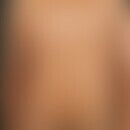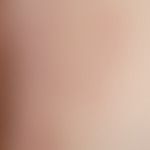Synonym(s)
DefinitionThis section has been translated automatically.
ManifestationThis section has been translated automatically.
Mainly occurring in female adolescents and young women.
You might also be interested in
ClinicThis section has been translated automatically.
Differential diagnosisThis section has been translated automatically.
Complication(s)(associated diseasesThis section has been translated automatically.
External therapyThis section has been translated automatically.
Disinfecting sitz baths with e.g. polyvidon-iodine solution (e.g. Betaisodona Lsg., R203 ) or potassium permanganate solution (light pink).
Soft zinc pastes or gels with zinc sulphate have an antiphlogistic effect.
In the development phase glucocorticoids can also be used in the short term, e.g. as foam or cream, if necessary with antiseptic additives. They shorten the duration of the disease (e.g. magistral hydrocortisone cream 0.5-2.0%).
Furthermore, drying dye brushes are suitable, e.g. with aqueous eosin solution(eosin disodium solution, aqueous 0.5/1/2% ) or methylrosanilinium chloride solution or disinfecting vaginal suppositories (e.g. Betaisodona vaginal gel, Betaisodona vaginal suppositories).
Note: Topical antivirals (Aciclovir, Tromantadin, Penciclovir, Vidarabin etc.) have been shown to be ineffective in genital herpes. They are not indicated for vulvangitis herpetica as primary infection.
Cave! Bacterial or mycotic superinfections.
Internal therapyThis section has been translated automatically.
Primary infection:
- In severe cases, systemic therapy with aciclovir (Zovirax 200) 5 times/day 1 tbl. every for 5-10 days. Oral therapy is usually sufficient.
- Alternative: Aciclovir 400mg p.o. 3x daily for 7-10 days.
- Alternative: If necessary, intravenous therapy with aciclovir can be considered (aciclovir 5 mg/kg bw 3 times/day every 8 hours for 5 days).
- Alternative: Valciclovir: 500-1000mg p.o./2x/day for 5-10 days.
- Famciclovir: 250mg p.o. 3x/day for 5-10 days.
- Patients with immunosuppression: Aciclovir 400mg 4x/day or Zovirax 800mg 5 times/day.
Recurrence:
- Systemic therapy with aciclovir (Zovirax 200) 2 times/day 1 tbl. for 5-10 days. Oral therapy is usually sufficient.
- Alternative: Aciclovir 800mg p.o. 3 times/day for 2 days.
- Alternative: Valciclovir: 500mg p.o./2x/day for 3-5 days.
- Famciclovir: 125mg p.o. 2x/day once.
Relapse prophylaxis:
- Systemic therapy with aciclovir (Zovirax 400) 2x/day.
- Alternative: Valciclovir: 500mg p.o./1x/day
- Famciclovir: 250mg p.o. 2x/day
Usually, relapse prophylaxis is given for months to years. It is successful in 80% of patients, the recurrences are significantly reduced. Periodic breaks in therapy are necessary to control the recurrence.
Progression/forecastThis section has been translated automatically.
Scarless healing after 2-3 weeks.
LiteratureThis section has been translated automatically.
- Corey L et al (2004) Once-daily valacyclovir to reduce the risk of transmission of genital herpes. N Engl J Med 350: 11-20
- Kaplowitz LG et al (1991) Prolonged continous acyclovir treatment of normal adults with frequently recurring genital herpes simplex virus infections. JAMA 265: 747-751
- Lautenschlager S et al (2000) Herpes genitalis. dermatologist 51: 964-980
- Maccato ML (1992) Herpes genitalis. Dermatol Clin 10: 15-22
- Villa A et al (2003) Genital herpes infection: beyond a clinical diagnosis. Skinmed 2: 108-112
Incoming links (7)
Eosin disodium solution aqueous 0,5/1/2 % (nrf 11.95.); Eosin disodium solution, ethanol 0,5/1/2 % (nrf 11.94.); Genital herpes; Gingivostomatitis herpetica; Hydrocortisone cream 0.5-2.0% (w/o); Povidone-iodine solution 10%.; Vulvovaginitis herpetica recidivans;Outgoing links (14)
Aciclovir; Acutal ulcer; Antiseptic; Disinfectants; Eosin disodium solution aqueous 0,5/1/2 % (nrf 11.95.); Gentian violet; Glucocorticosteroids; Hydrocortisone cream 0.5-2.0% (w/o); Molle ulcer; Potassium permanganate; ... Show allDisclaimer
Please ask your physician for a reliable diagnosis. This website is only meant as a reference.






